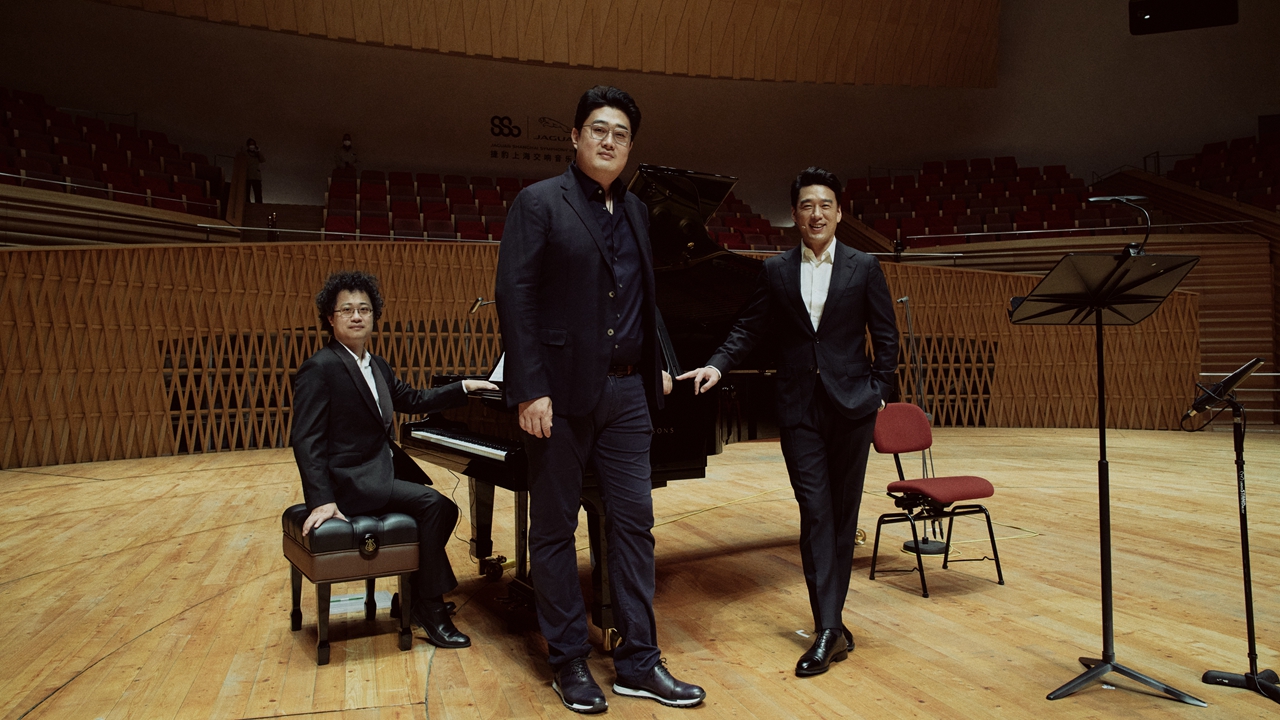Explore the beauty of Tang poetry through art songs
A gem of classical Chinese literature, Tang Dynasty (618-907) poetry has been translated into many different languages and inspired many other art forms. The best-known evidence is German poet Hans Bethge’s (1876-1946) translation of Tang poems set in Gustav Mahler’s “Song of the Earth.”
This Sunday evening, local fans of music and traditional Chinese culture are in for a treat, as bass baritone Shenyang will sing nearly 20 art songs in seven languages, whose lyrics are translated from Tang poetry and set to music by composers from various countries. Shenyang has combined his name to be spelled as one word.

(From L) Zhang Yiming, Shenyang and David Wang give a curtain call after performing at the Shanghai Symphony Orchestra Hall in Shanghai on Oct. 21.
Zhang Yiming, a teacher at Xinghai Conservatory of Music, will accompany Shenyang on the piano. Chinese actor David Wang will recite the original poems in Chinese as well as explain the music features of each song as well as the behind-scenes stories of their creation.
Mahler set seven Tang poems to music and included them in his masterpiece “Song of the Earth,” and became the trendsetter in seeking inspiration from ancient Chinese poems among European composers. Before Bethge translated and provided lyrics for Mahler, French woman poet Judith Gautier (1845-1917) had translated Chinese poems, and sometimes borrowed images from those poems to create her own. She ultimately published 71 Chinese poems in a collection titled “The Jade Book.” Her anthology had a huge influence and was retranslated into German, English, Spanish, Portuguese, Italian and Russian. More than 100 pieces of ancient Chinese poems, most of which are from the Tang Dynasty, were set to music by classical composers, chiefly during the late 19th and early 20th centuries.
The songs to be performed during this concert come from British composer Arthur Bliss, Austrian Hans Gal, American John Alden Carpenter, Chinese Ye Xiaogang and others. But of course, the audience members are more familiar with the poems that inspired the songs. They will have the opportunity to rediscover Li Bai’s “Thoughts on a Tranquil Night,” “Song of Purity and Peace,” Zhang Ruoxu’s “A Moonlit Night on the Spring River,” and Zhang Ji’s “Nighttime Mooring by Maple Bridge” among others, sung beautifully in different languages.
In Russian Alexander Tcherepnin’s interpretation of Li’s poem that describes the stunning looks of a Tang emperor’s concubine, Yang Yuhuan, the composer used the piano to mimic the sound of a Chinese percussion instrument, the small gong. “You can hear a resemblance but obviously there’s the difference, which is very interesting,” explained pianist Zhang.
Shenyang is one of the most talked-about young singers in opera. He won the prestigious Cardiff Singer of the World Competition in 2007 at 23. He graduated from the Shanghai Conservatory of Music, The Julliard School and the Salzburg Young Artist Project before joining the Metropolitan Opera’s Lindemann Young Artist Program.
He said he personally likes Tang poems better than the Song (960-1279) poetry. “I feel that Tang poems are subtler,” he said. “Tang poems serve a significant role in cultural exchanges between China and the West, and these art songs, a recreation by Western poets and composers, provide a new dimension for people to appreciate our own cultural traditions.”
The concert has been met with enthusiasm during its previous performances in Macao and Shanghai earlier this year.
Time: 8 p.m., Dec. 11
Tickets: 180-680 yuan
Booking: WeChat account “szyyt_piao”
Venue: Shenzhen Concert Hall, Futian District (深圳音乐厅)
Metro: Line 3 or 4 to Children’s Palace Station (少年宫站), Exit D